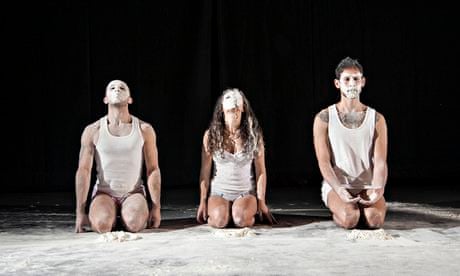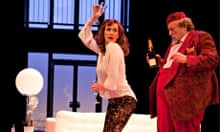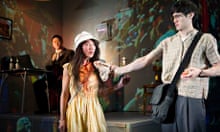It's Saturday morning, and I am sitting cross-legged in a big, dark room. Around me is a circle of people doing the same, their faces lit by flickering candles. One of them is Mark Storor. "This is Puffball," he says. "It's not going to change the world. But it might just change the way people think."
Puffball, which is about to have its premiere at CircusFest, the annual celebration of big-top acts at London's Roundhouse, is built on true stories: the experiences (sometimes funny, sometimes harrowing) shared with Storor and his team by more than 80 young people from around the country, all of whom identify as lesbian, gay, bisexual, transgender or questioning (LGBTQ).
Storor has whittled this figure down to 10 people, aged 16 to 25, who will appear alongside eight professional circus artists, whose skills include fire-eating, contortion, the cloud swing and the flying trapeze. Today, in the last talking session before the company moves on to developing the circus elements of the show, Storor has asked the performers to choose an object that means something to them – and set it inside a dish of jelly. This feels a lot more serious in the room than it might sound in the retelling: the stories that unfold are intense, hilarious and deeply moving.
Felix Briant, 23, has set a pair of cocktail sticks inside a bowl of red jelly. They were given to him, he explains, by a handsome older man from whom he once stole a kiss. Another performer produces what looks like a neatly wrapped present. Inside is a rectangle of jelly, studded with sleeping tablets and a bottle of water. "This is the gift of suicide," he says. "Surviving a suicide attempt changes your life for ever."
Storor's work treads the fine line between theatre and performance art: he once spent six months in an ice-cream van, asking passersby to swap songs for 99s. In 2009, he spent nine months developing a show, For the Best, with children in the dialysis unit at London's Evelina hospital.His last piece for the Roundhouse, 2011's Fat Girl Gets a Haircut, was an account of childhood and adolescence, drawing on the experiences of 13 teenagers. It was while making Fat Girl that he came up with the idea for Puffball. "Lots of stuff about sexuality came up that we didn't fully explore," he says. "I began to realise that lots of young people are homeless, or their family life has broken down, because of their sexuality. I wanted to look into that."
Storor's concept certainly seems to resonate with his Puffballers. Alexis Spencer, 16, says: "My mum wanted me to come. I didn't really know what I was letting myself in for, but I've found I can really be myself with everyone – there's no filter." Jolene O'Sullivan, 24, agrees. "I don't get much hassle for being gay where I'm from," she says, "but there's still a sense out there that it's something abnormal. The message of the show is that nobody should be afraid of who they are."
But how do all these good intentions result in a show that audiences can make sense of? A few weeks later, I return to find out. Curtain-up is just a few weeks away, and Storor and cast are rehearsing inside an old gin-making site in east London. Spencer and another performer, Luca Brown, are sitting in a claw-foot bath, playing with dolls-house furniture: a scene inspired by stories they all told about home life.
Briant has clearly moved on from cocktail sticks: he shows me something he wrote called What the Fuck Is Love? He plans to read it aloud, while several circus artists slip inside mattresses and follow him unsteadily around, their lips protruding obscenely from slits. The effect, I can testify, is both absurd and unsettling.
Puffball will also showcase more traditional circus spectacles: two male acrobats will dangle elegantly from a heavy chain, performing a tender pas de deux, and a group of female trapeze artists will lift one another high into the air, aiming to trace the arc of an individual's journey from birth to afterlife. This arc will feature intimate moments drawn from their workshop stories of love, loss, happiness, success and failure. The stuff of life, in short, that anyone can relate to, whether LGBTQ or not.
"It does feels like a significant time to be making this," says Storor. "It feels like the world's becoming more and more brutal. Puffball presents a moment in which people can go, 'Well, what is happening is terrible – but actually, somewhere in the world there is a company who are identifying as LGBTQ, and they're telling their stories.' For me, in the end, the show is about tenderness and listening to one another."
Puffball is at the Roundhouse, London NW1, 22–27 April (roundhouse.org.uk/0844 482 8008). Then touring to Cast, Doncaster (1-2 May) and Royal Exchange theatre, Manchester (8–9 June).
Naked juggling and hair-hanging: CircusFest 2014 - in pictures






Comments (…)
Sign in or create your Guardian account to join the discussion